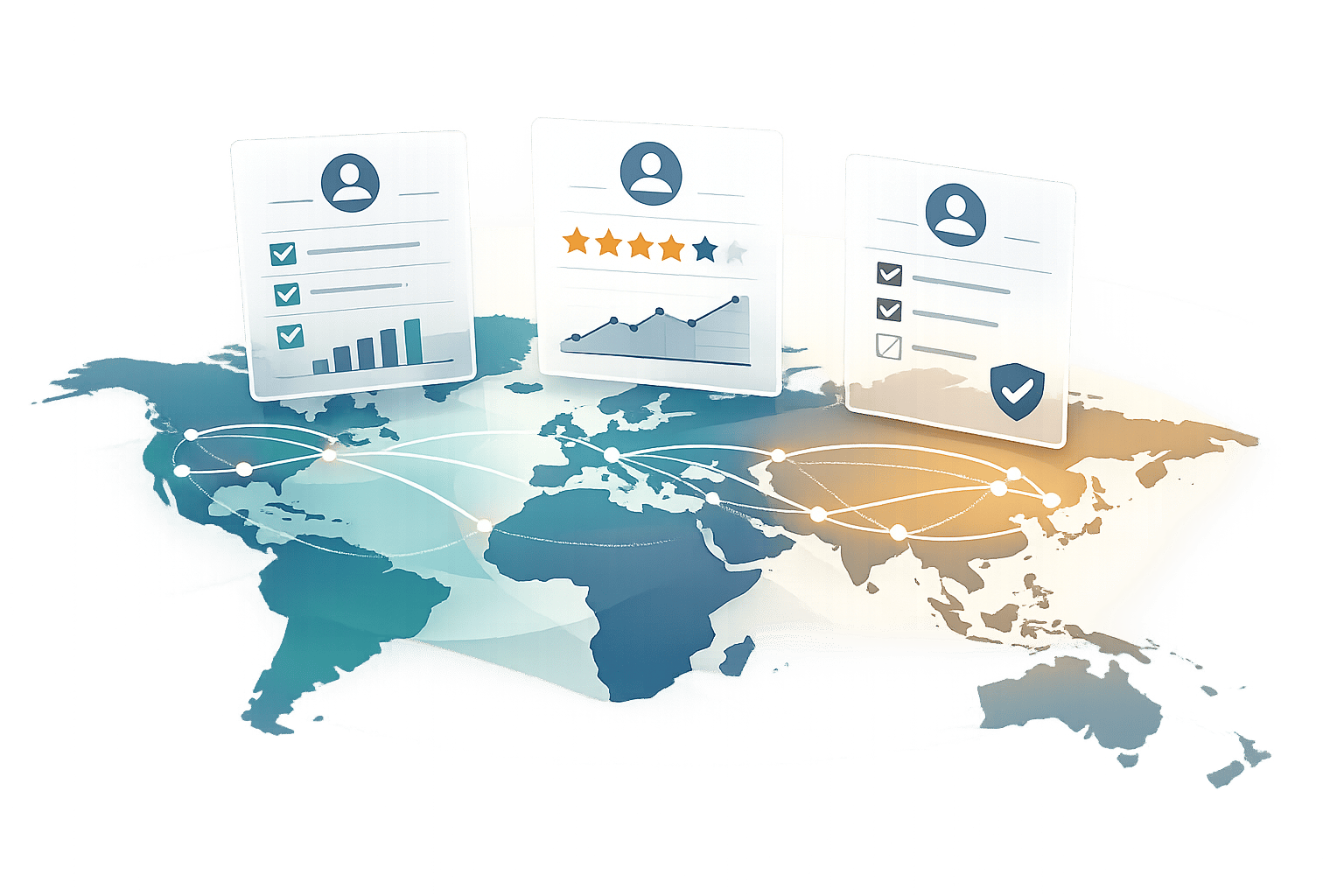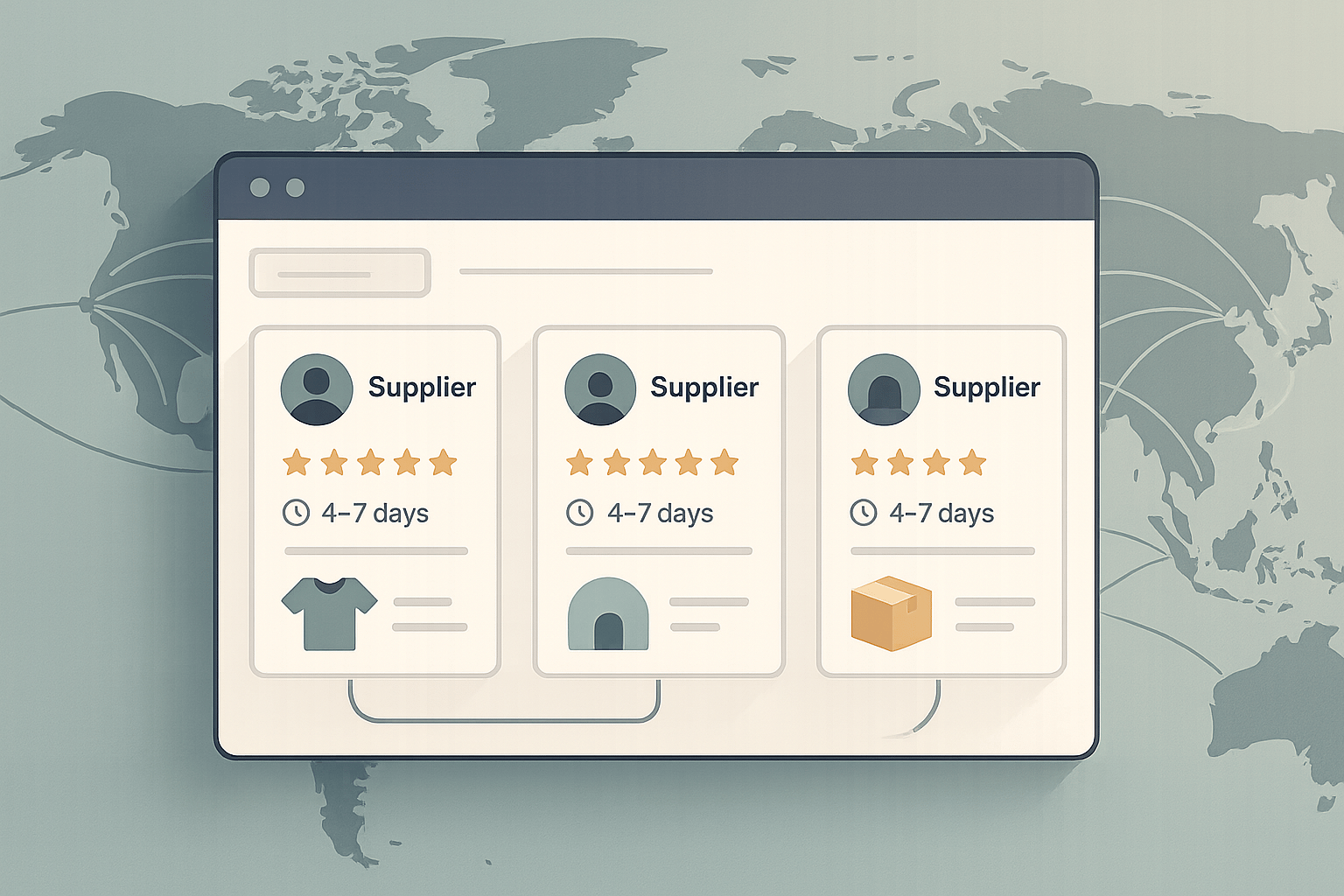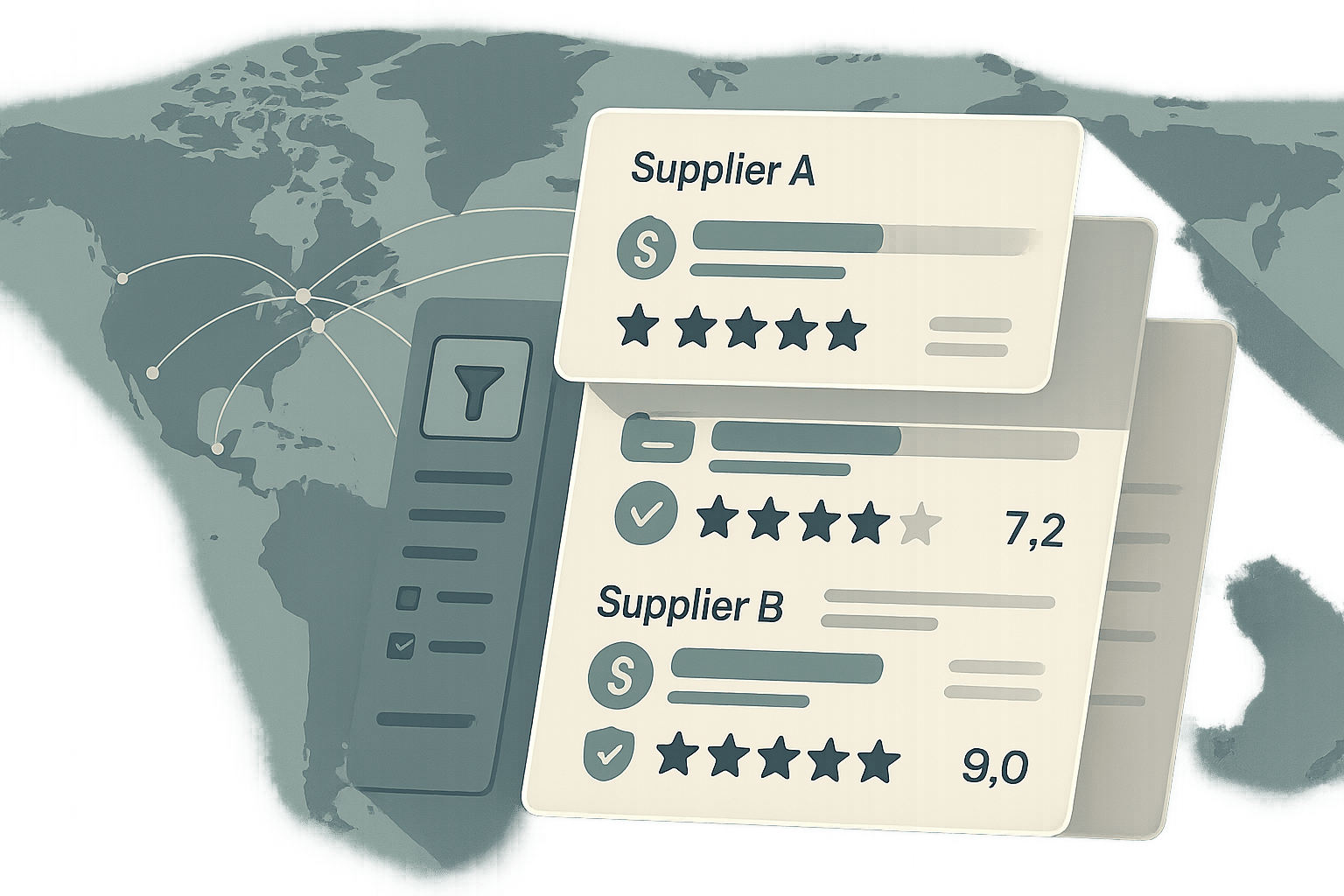Looking for the best supplier sourcing tools to grow your DTC (direct-to-consumer) brand? Here's a quick guide to help you navigate the options. With U.S. DTC ecommerce sales projected to reach $186.6 billion by 2025, building a reliable supply chain is more important than ever. These tools simplify supplier discovery, ensure compliance, and help streamline your procurement process.
Top 10 Tools at a Glance:
- ForthSource: AI-powered supplier discovery with compliance monitoring and team collaboration features.
- Alibaba: Global B2B marketplace with verified suppliers and trade assurance for secure transactions.
- Thomasnet: Focused on North American suppliers with strong compliance filtering.
- Global Sources: Curated supplier network, ideal for electronics, fashion, and home products.
- NicheSources: Personalized sourcing agent for DTC brands, specializing in custom products.
- Jungle Scout: Amazon-focused tool with a supplier database based on U.S. import records.
- Centric Software: Comprehensive PLM solution for managing suppliers, compliance, and product development.
- Admetrics: Data-driven insights for sourcing decisions and marketing strategy optimization.
- MyAmazonGuy Sourcing Tools: Tools for Amazon sellers to identify profitable suppliers and products.
- Practical Ecommerce Directories: Basic supplier directories for budget-conscious brands.
Quick Comparison Table
| Tool | Best For | Key Features | Pricing Structure |
|---|---|---|---|
| ForthSource | eCommerce brands | AI supplier ratings, compliance monitoring | Tiered subscription |
| Alibaba | Large-scale sourcing | Verified suppliers, trade assurance | Free & paid tiers |
| Thomasnet | Domestic sourcing | ISO certifications, compliance filters | Custom pricing |
| Global Sources | Niche industries | Verified suppliers, factory tours | Membership fees |
| NicheSources | Custom product sourcing | Personalized sourcing, free quotes | Pay-per-service fee |
| Jungle Scout | Amazon sellers | Competitor insights, import data | Monthly/annual plans |
| Centric Software | Regulated industries | PLM, compliance workflows, supplier tracking | Enterprise licensing |
| Admetrics | Data-driven decisions | Predictive analytics, marketing insights | Performance-based |
| MyAmazonGuy | Amazon marketplace sellers | Supplier audits, real-time market insights | Service-based pricing |
| Practical Ecommerce | Budget-conscious startups | Basic supplier directories | Directory access fees |
Why It Matters
Efficient supplier sourcing saves time, cuts costs, and ensures product quality. Whether you're a startup or scaling up, these tools help you find the right suppliers, manage compliance, and optimize supply chain operations. Choose the one that fits your business needs and budget.
Insider Tips: The ULTIMATE Guide to Product Sourcing for Beginners - Brendan Elias
Key Features to Consider in Supplier Sourcing Tools
When you're evaluating supplier sourcing tools for your DTC brand, certain features stand out as game-changers for building efficient supply chains. The right tools can save you time, cut costs, and help strengthen relationships with your suppliers.
Supplier Discovery and Database Access is the backbone of any sourcing tool. Traditional supplier searches can take months, requiring over 40 hours of manual effort, according to McKinsey. Modern AI-powered tools, however, can reduce this process to just a few hours. Look for platforms that pull supplier data from various sources and provide detailed information like contact details, certifications, and product catalogs. These basics lay the groundwork for more advanced features.
Advanced Rating and Scoring Systems help distinguish a good tool from a great one. These systems evaluate suppliers on multiple fronts, such as quality, pricing, delivery performance, and compliance. This multi-dimensional assessment ensures you're working with the best options available.
"AI can also detect patterns humans might miss and provide actionable insights. This data informs their supply chain strategies, optimizing procurement and minimizing waste and costs associated with overstock."
– Jack Macfarlane, Founder and CEO of DeepStream
Compliance Management and Risk Assessment are crucial in today's regulatory environment. The right tool will help you monitor supplier certifications, track quality standards, and flag potential issues early. Companies that map their supply chains and assess supplier vulnerabilities are better equipped to secure alternatives before crises arise.
Data Accuracy and Real-Time Insights are key to making informed decisions. Your sourcing tool should provide up-to-date market data, including sales forecasts, competitor trends, and pricing shifts. Predictive analytics can be especially useful, allowing you to identify risks and act before they disrupt your operations.
"Predictive analytics are of tremendous help in eliminating traditional research and analysis of procurement professionals, ultimately allowing them to be more efficient, productive and valuable to their business partners."
– Keith Hausmann, Chief Customer Officer, Globality
To make the most of these insights, your tool should integrate seamlessly with your existing systems. Integration and Workflow Capabilities are essential for streamlining processes. The best tools connect with eCommerce platforms, inventory management systems, and communication tools. Features like saved searches, exportable reports, and shared workspaces enable teams to collaborate effectively while evaluating suppliers.
Communication and Negotiation Tools can also speed up the sourcing process. Advanced platforms now use AI chatbots to automate initial supplier outreach and streamline quote collection. Studies show that automation like this can boost procurement efficiency by 30%.
Budget and Pricing Flexibility is another must-have for growing DTC brands. Look for tools with flexible pricing models, free trials, or tiered plans that grow with your business. Don’t forget to consider the total cost, including setup fees, training, and ongoing subscription costs.
The most effective tools combine multiple data sources to create detailed supplier profiles. Some platforms, for instance, provide access to U.S. import data, which allows you to see which factories brands are working with. This can help you identify reliable suppliers based on their track record with similar companies.
"The Jungle Scout supplier tool lets users look up products... What's cool about this is we essentially have all of the data from all imports coming into the U.S. When I say data, I am talking about who is importing it…who manufactured or created the goods, and some other information like quantities and weights… But the reason this is so powerful… [is that] you can see what factories different companies are using to manufacture their goods."
– Greg Mercer, CEO of Jungle Scout
1. ForthSource
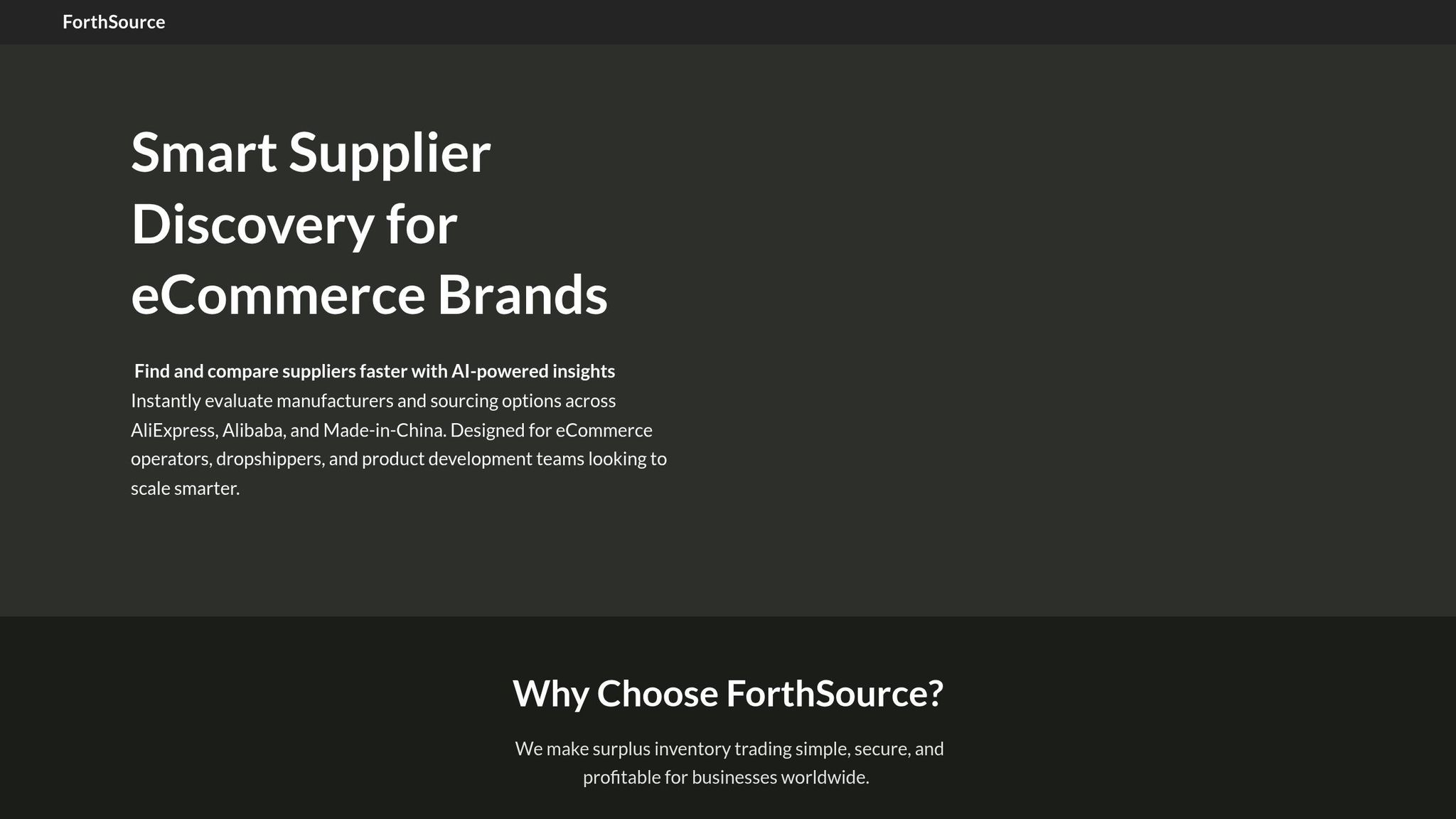
For DTC brands aiming to keep their supply chains nimble, picking the right supplier sourcing tool is a must. Enter ForthSource - a supplier discovery platform tailored for eCommerce brands, dropshippers, and product development teams. It simplifies the supplier evaluation process with features like instant comparisons and a smart rating system.
Supplier Discovery Capabilities
ForthSource makes supplier research easy. Just plug in a product URL or keyword, and the platform pulls supplier data from major marketplaces like AliExpress, Alibaba, and Made-in-China. Its smart rating system evaluates vendors based on key factors like reviews, order history, responsiveness, and shipping speed, helping you zero in on dependable partners quickly. You can also compare vendors side-by-side on metrics like reliability, price, shipping time, and reviews - all from a single dashboard.
As Alex Chan, Supply Lead at Luma Goods, put it:
"We cut sourcing time by 40% using ForthSource's scoring system. Game changer."
– Alex Chan, Supply Lead at Luma Goods
On top of that, ForthSource lets you save searches and track your shortlisted vendors over time. This feature helps you build a sourcing playbook that evolves with your business. And since the platform includes compliance monitoring, you can rest assured you're working with trustworthy suppliers.
Compliance and Quality Assurance Features
ForthSource goes beyond just finding suppliers - it highlights those that meet U.S. and European standards. Its system focuses on continuous evaluation and monitoring of supplier performance, helping you reduce compliance risks. With this level of oversight, you can ensure your supply chain aligns with industry standards while maintaining quality.
Collaboration and Reporting Tools
ForthSource doesn’t just help you find suppliers - it also makes teamwork easier. The platform includes a private workspace where your team can collaborate on supplier evaluations without exposing sensitive sourcing strategies. Here, team members can share notes, assessments, and insights, building a strong foundation of supplier intelligence.
Need to share findings? ForthSource lets you export reports, making it simple to present data to stakeholders or integrate it into existing procurement workflows. By keeping your research and supplier relationships confidential, this tool becomes a crucial ally in crafting a winning sourcing strategy.
2. Alibaba
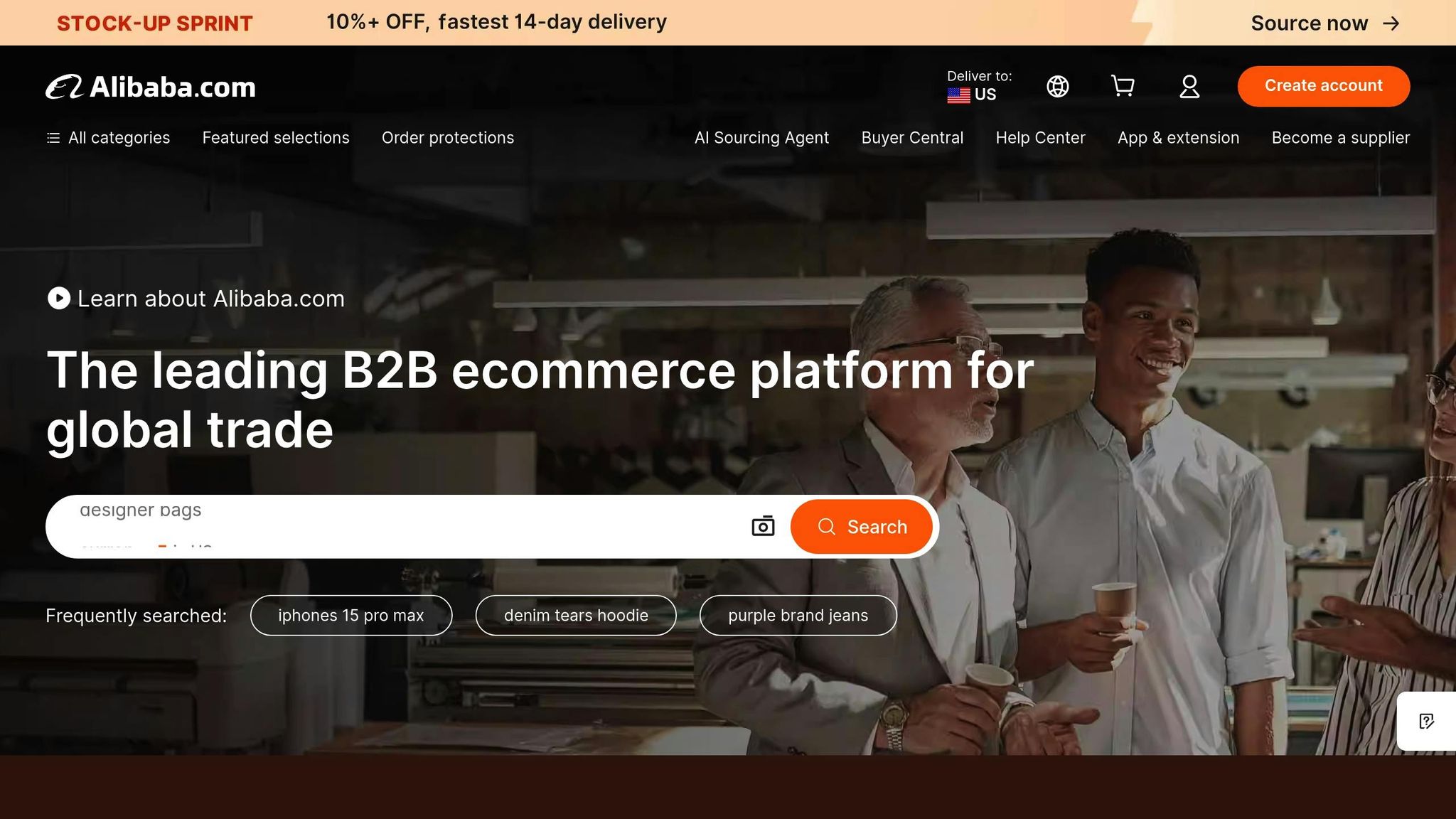
Alibaba stands as one of the largest B2B marketplaces globally, linking buyers with wholesalers and manufacturers. With a catalog of over 200 million products, the platform supports more than 20 international payment methods and currencies, making it a convenient choice for U.S.-based businesses handling cross-border transactions.
Supplier Discovery Capabilities
Alibaba simplifies supplier discovery for DTC brands by offering tools to connect with trustworthy partners. The platform classifies suppliers into three verification levels:
- Gold Suppliers: These suppliers pay for membership and undergo third-party credential checks, ensuring a baseline of trust.
- Verified Suppliers: These suppliers pass detailed audits and inspections conducted by independent institutions.
- Verified Pro Suppliers: This group demonstrates higher performance with years of experience, larger trade volumes, and superior service metrics.
For added security, use the "Trade Assurance" filter, which ensures secure payments, quality control, and dependable delivery. Customer reviews and ratings also provide firsthand insights into supplier reliability. If you're looking for more specific sourcing options, try the 'Verified' filter or the Manufacturers tab on the product search page to narrow results to audited factories.
Compliance and Quality Assurance Features
Alibaba's Verified Supplier program ensures suppliers meet legitimacy standards. Through partnerships with third-party inspection companies like SGS and TÜV Rheinland, the platform offers on-site verification services to bolster trust.
The Trade Assurance program provides added security for online transactions, covering shipments to 169 countries. This program includes protections like payment security, quality guarantees, and on-time delivery commitments. Buyers can also request third-party inspection services to verify product quality before shipment. For even greater peace of mind, consider requesting product samples to assess quality firsthand and check for certifications like ISO or CE. For high-value purchases, hiring a third-party inspection agency is a smart move.
Integration with Marketplaces and Directories
While Alibaba excels at connecting buyers and suppliers, its marketplace integrations are somewhat limited. Currently, it offers direct connections with Shopify and WooCommerce. These integrations make it easier for DTC brands using these platforms to import products and streamline dropshipping operations. For other eCommerce platforms, Alibaba teams up with third-party services to provide tools for product search, listing customization, importing, and order tracking.
The Alibaba Guaranteed service supports small and medium-sized businesses by handling orders through Alibaba Logistics. This service ensures order security and minimizes logistical challenges, making it a great option for DTC brands that want to prioritize marketing and customer acquisition over supply chain management.
Collaboration and Reporting Tools
Alibaba includes built-in communication tools that keep all supplier interactions within the platform. This helps ensure transaction security and maintains clear records of negotiations. For order management, DTC brands can create Trade Assurance contracts, which outline product details, quantities, and shipping terms. Users can also upload specifications and process payments through Alibaba's secure payment system.
While the platform's reporting features focus mainly on order tracking and supplier performance metrics, they still provide essential visibility into sourcing activities. These tools allow teams to make informed decisions and maintain control over procurement processes. Together, Alibaba's features create a reliable ecosystem for DTC brands seeking dependable supplier connections.
3. Thomasnet
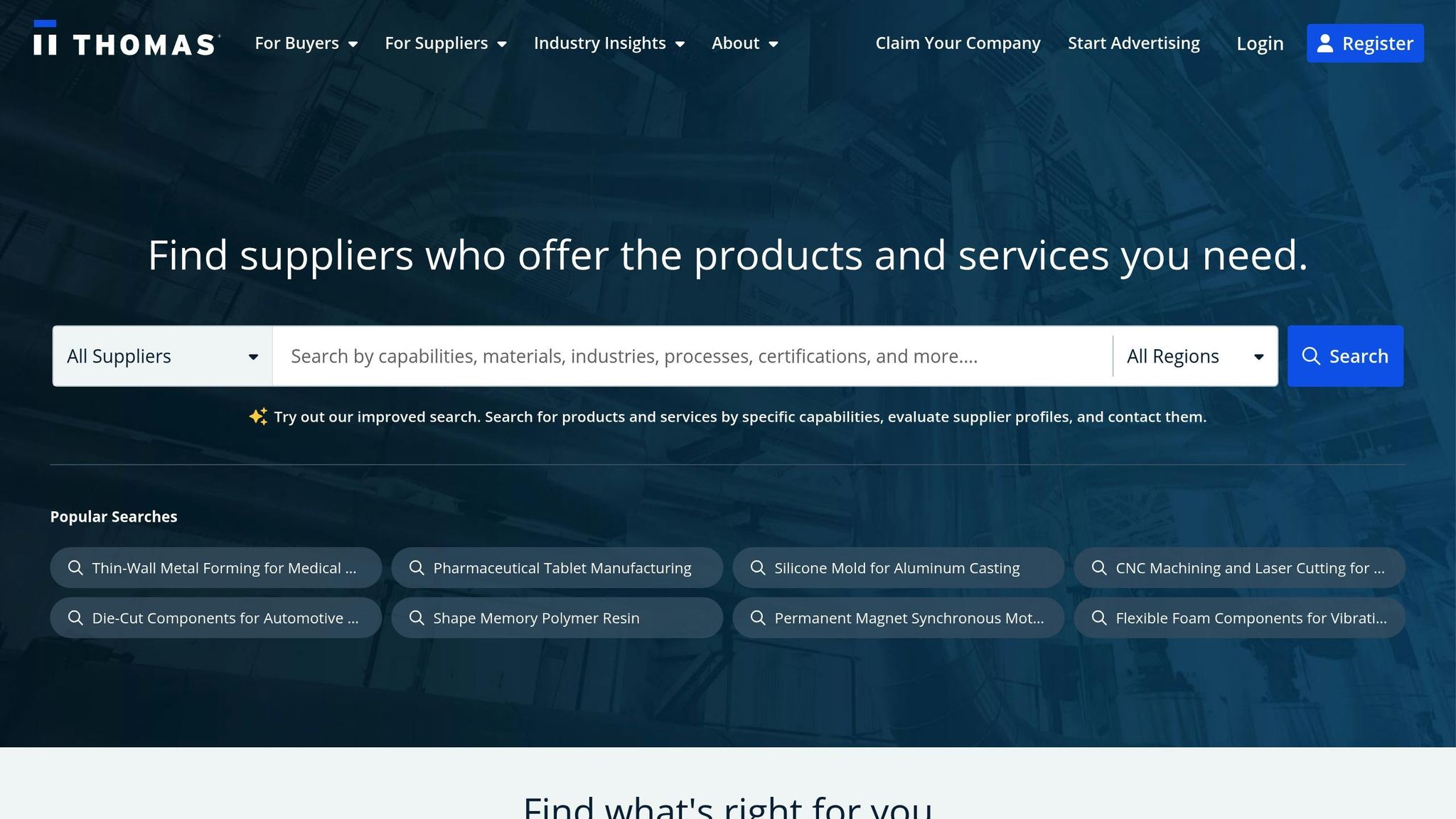
Thomasnet has been bridging the gap between buyers and North American manufacturers for over 120 years. With a database featuring more than 500,000 suppliers and 6 million products, the platform is particularly valuable for connecting DTC brands with domestic manufacturers and industrial suppliers.
Supplier Discovery Capabilities
Thomasnet stands out for its robust tools that help DTC brands locate reliable North American suppliers. Its search and filtering options allow users to refine searches based on certifications, location, company type, and diversity.
To further support supplier credibility, Thomasnet offers two key validation badges:
- Thomas Registered: Indicates suppliers with verified contact details.
- Thomas Verified: Signifies suppliers that meet stricter vetting criteria.
These badges provide an extra layer of confidence for brands evaluating potential manufacturing partners.
Another useful feature is the ability to create and manage supplier shortlists. Users can compile lists of preferred suppliers and export them as CSV files for integration with procurement systems. This functionality simplifies supplier evaluation and ensures a smoother compliance process.
"We're all about making buyers' lives easier and enabling them to work more efficiently." - Mark Holst-Knudsen, president of ThomasNet
Compliance and Quality Assurance Features
Thomasnet goes beyond supplier discovery by offering tools that ensure vendors meet high-quality standards. Filters for certifications and compliance help DTC brands find suppliers that align with specific regulatory needs. Available certifications include ISO 9001, ISO 14000, AS9100, and ISO/IEC 17000.
For industries with specialized regulatory needs, Thomasnet supports filtering for compliance standards such as:
- CMMC (Cybersecurity Maturity Model Certification)
- Conflict Minerals Disclosure
- EPA regulations
- FDA compliance
This makes it easier for brands in regulated sectors to identify suppliers capable of meeting stringent requirements. Additionally, the platform connects users with specialists who assist with tasks like permit applications, developing compliance strategies, and creating custom programs for ongoing regulatory adherence.
Integration with Marketplaces and Directories
Although Thomasnet doesn’t integrate directly with marketplaces, it offers CSV export functionality for supplier shortlists. This allows DTC brands to seamlessly transfer supplier data into ERP systems or procurement software.
Rather than relying on complex integrations, Thomasnet focuses on detailed search capabilities to simplify the supplier discovery process. This approach appeals to brands that prefer to maintain control over their sourcing workflows without being tied to a specific platform ecosystem.
While its primary focus is on North American suppliers, Thomasnet also enables businesses to explore international options when domestic resources fall short. This flexibility provides access to a broader supplier network, all while maintaining a strong emphasis on quality and reliability.
4. Global Sources
Global Sources stands out by employing a stringent vetting process, ensuring that only verified manufacturers make it onto their platform. This approach is particularly suited for industries like electronics, fashion, gifts, and home products, providing businesses with tailored sourcing options.
Supplier Discovery Capabilities
By maintaining a carefully curated network of rigorously screened suppliers, Global Sources saves businesses the hassle of dealing with unqualified vendors. This platform focuses on specific industries - such as electronics, fashion, gifts, and home products - making it easier to find manufacturers that meet precise needs. Additionally, its geographic flexibility allows brands to diversify their supply chains effectively.
Compliance and Quality Assurance Features
Global Sources helps businesses conduct thorough due diligence with features like factory tours and negotiation support. These services are especially helpful for smaller direct-to-consumer (DTC) brands, enabling them to secure better terms with suppliers. The platform’s structured quality control measures also reduce risks when working with new manufacturers, ensuring smoother operations.
Integration with Marketplaces and Directories
One of the platform's key strengths is its ability to connect brands with pre-vetted suppliers from around the world. Instead of focusing solely on one-off transactions, Global Sources emphasizes building long-term supplier relationships. This comprehensive approach makes it a valuable resource for DTC brands looking for reliable and consistent supplier partnerships.
5. NicheSources
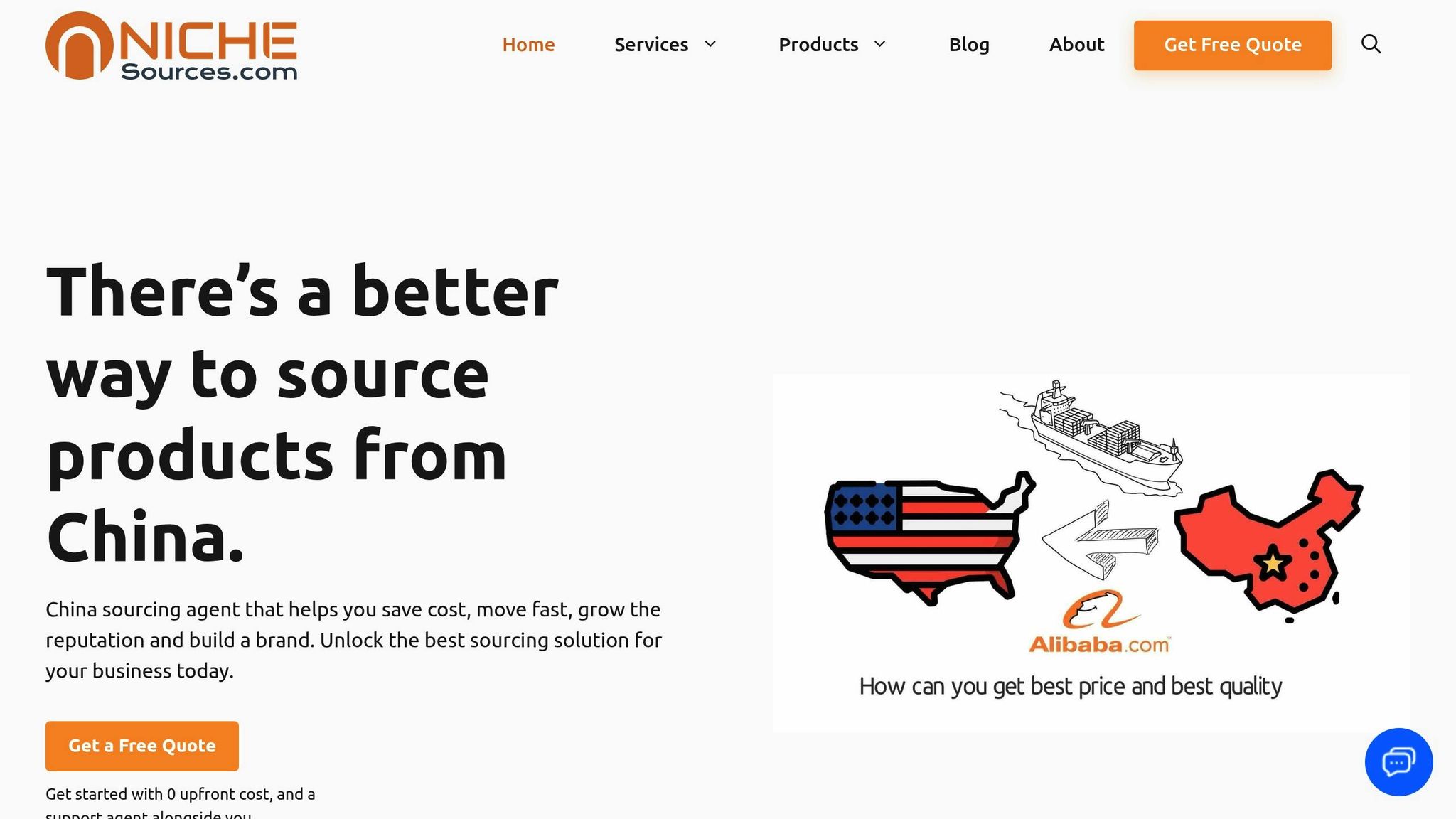
NicheSources acts as a sourcing agent in China, tailored specifically for DTC (direct-to-consumer) brands. It connects businesses with suppliers capable of developing and branding products to fit unique needs. This personalized approach simplifies the supplier discovery process and ensures brands find the right fit.
"Your business is unique. So we tailor our services to suit your needs." – NicheSources
The platform operates with a 5–10% service fee on the total order value. However, the initial product sourcing service is completely free - you only pay if you're satisfied with the quote and decide to move forward with an order.
Supplier Discovery Capabilities
NicheSources uses a dual strategy to locate reliable suppliers. It taps into well-known B2B platforms like Alibaba and 1688 while leveraging its local network in China to identify manufacturers that are harder to find. A dedicated support agent guides brands through the entire sourcing process, offering personalized assistance [52, 53].
"Finding a good supplier in your niche is not easy. That's where we come in. We'll match you up with the right suppliers, making sure you get exactly what you asked for, in time and within budget." – NicheSources
To begin, DTC brands submit detailed sourcing requests, including their business model, product specifications, and expectations.
Compliance and Quality Assurance
NicheSources doesn’t just connect brands with suppliers - it also prioritizes quality. By working with pre-vetted factories, the platform ensures a high standard across all product batches. This focus on quality control minimizes risks and ensures consistency throughout the production process.
Integration with Marketplaces and Directories
The platform goes beyond sourcing by integrating manufacturing, shipping, and other services into a single system. Businesses can receive free quotes within two business days without any upfront costs, making it easy to explore sourcing options quickly. Additional services include custom packaging, private labeling, product development and manufacturing, as well as logistics and fulfillment support.
6. Jungle Scout
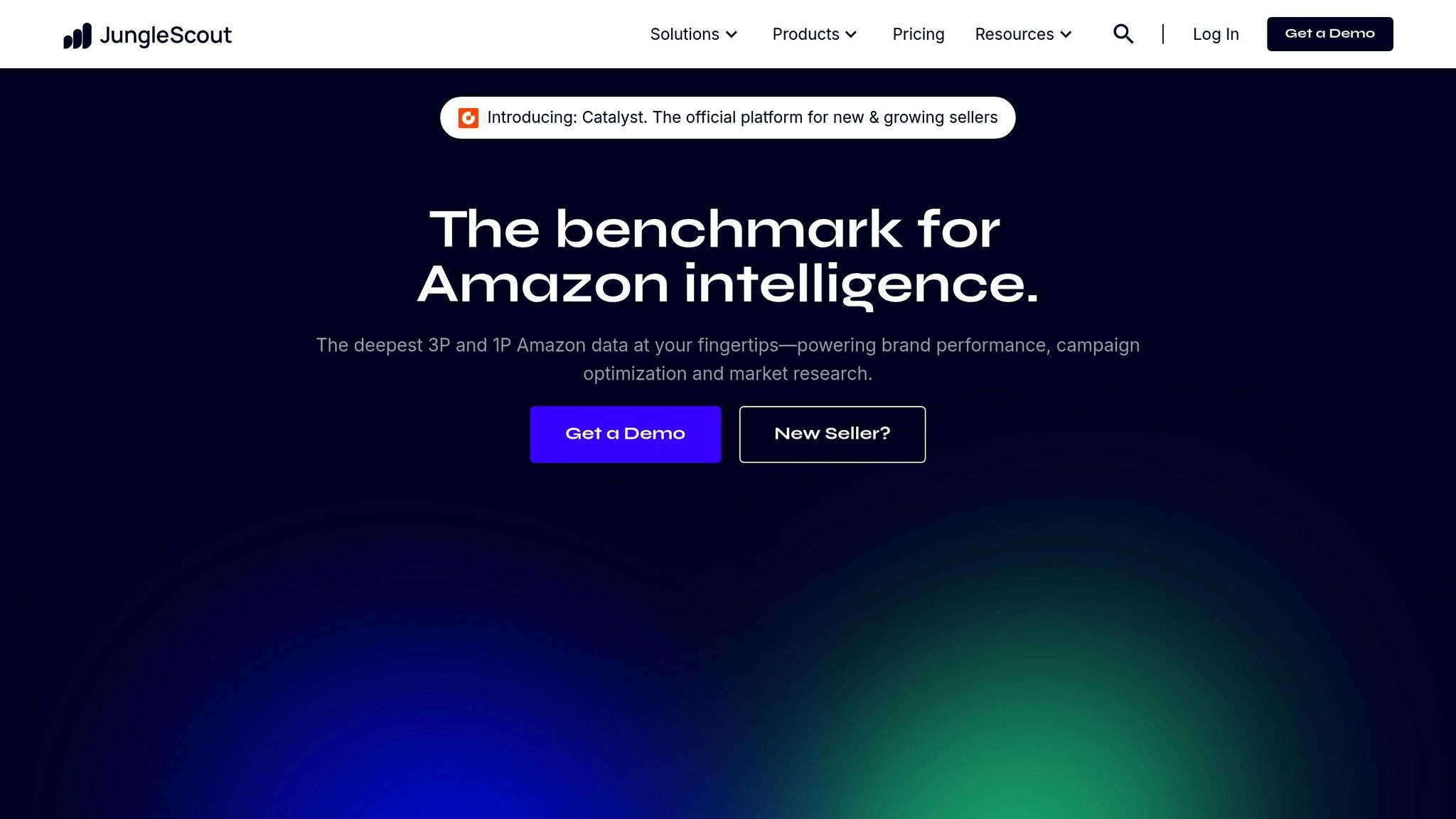
Jungle Scout is a tool tailored for Amazon sellers, designed to refine direct-to-consumer (DTC) sourcing strategies. While it started as a product research tool, its Supplier Database has become a standout feature, helping users find dependable manufacturers and gain insights into competitors' sourcing approaches.
The platform offers three pricing plans: Basic at $29/month, Suite at $49/month, and Professional at $84/month. A 20% discount is also available for users who opt for annual billing. These plans include a variety of tools to enhance supplier discovery and management.
Supplier Discovery Capabilities
Jungle Scout’s Supplier Database uses U.S. import records to uncover verified suppliers. This lets users access supplier client lists, track confirmed shipments, and identify product niches. One particularly helpful feature is the ability to search Amazon products by ASIN, which reveals where competitors source their products.
To simplify vendor management, the Supplier Tracker allows users to compare supplier prices and organize vendor details in one central location.
Integration with Marketplaces and Directories
Built with Amazon sellers in mind, Jungle Scout ensures compliance with Amazon’s terms of service, helping users avoid issues like account suspensions. The platform also supports ethical review collection practices. It provides essential supplier data, such as product categories, order volumes, and countries of origin, all based on verified import records.
The tool’s sales estimation feature boasts an accuracy rate of 80–85%, with some estimates being within 5% of actual monthly sales figures.
Collaboration and Reporting Tools
Jungle Scout goes beyond supplier discovery by offering tools to streamline procurement. Users can compare quotes from multiple suppliers side-by-side and generate professional purchase orders directly within the platform. These features make it easier to manage sourcing and procurement workflows efficiently.
The platform has earned a 4.7-star rating on Trustpilot from over 2,900 reviews. Its Chrome Extension also holds a solid 4-star rating on the Google Web Store. Many users commend the Supplier Database and the platform’s responsive customer support team.
"Jungle Scout is the ONE tool I cannot live without" - Scott V., Author of The Amazing Seller
Additionally, Jungle Scout helps brands track key performance metrics like conversion rates, customer feedback, and inventory levels. These insights empower businesses to make data-driven decisions throughout their sourcing and selling journey.
sbb-itb-633367f
7. Centric Software
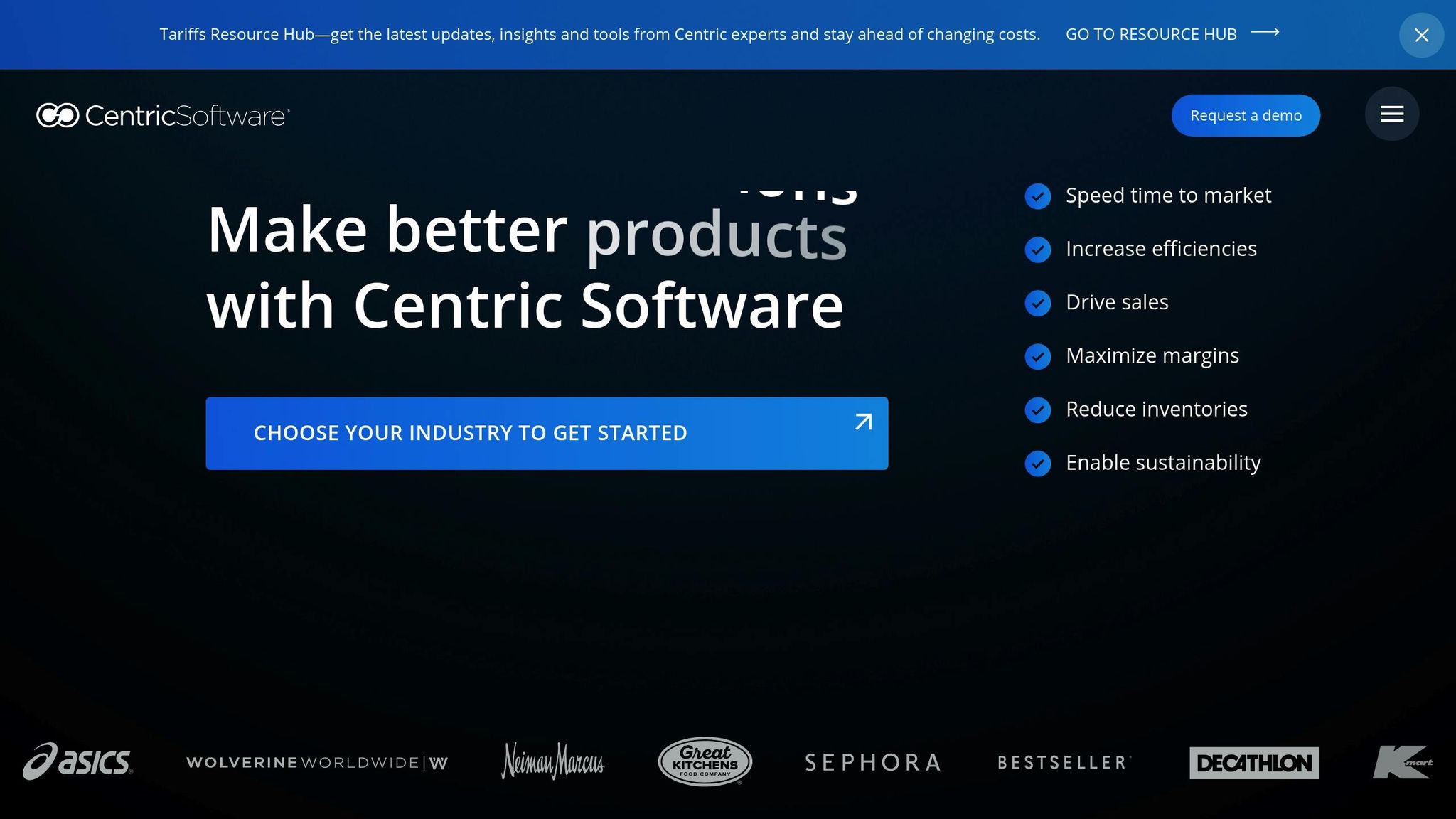
As direct-to-consumer (DTC) brands increasingly rely on unified digital solutions to manage suppliers and maintain quality, Centric Software has positioned itself as a vital tool. This platform offers a Product Lifecycle Management (PLM) solution that simplifies supplier management and product development. Acting as a centralized hub for product data, Centric Software enables teams to collaborate efficiently while ensuring strict adherence to quality and compliance standards. With over 18,800 brands using its solutions and an impressive 99% customer retention rate, it has demonstrated its effectiveness across a range of industries.
Supplier Discovery Capabilities
Centric PLM serves as a central repository for product information, streamlining communication between designers, product managers, engineers, and sourcing specialists. Its supplier collaboration tools provide real-time updates on material availability, pricing, and production timelines. Teams can easily share specifications, quotes, and track orders, creating a seamless workflow. These features make it easier for DTC brands to stay on top of supplier interactions while maintaining efficiency.
Compliance and Quality Assurance Features
Centric PLM also excels in managing compliance and quality assurance. The platform helps brands meet global standards for labeling, ingredient declarations, and sustainability requirements. Its automated change management system ensures that updates to raw material data, packaging labels, and compliance documents happen simultaneously, minimizing errors. Additionally, the supplier management tools allow procurement teams to monitor ingredient availability, costs, and certifications, enabling informed supplier decisions.
For example, H&H Group adopted Centric PLM in March 2025 to enhance quality and innovation across its research and development operations. By implementing modules for raw material and packaging management, product formulation, compliance, and pilot testing, the company has fostered better collaboration among its global teams.
Centric PLM has been shown to boost productivity by up to 50% and reduce time-to-market by 60%. A notable success story comes from Brazilian retailer Loghaus, which saw its time-to-market drop from 160–180 days to 145 days for several brands - and even to 120 days for its Bonprix brand - within just a few months of implementation.
"Before PLM, our time-to-market was 160 to 180 days. We have already reduced it to 145 days for several brands and 120 days for the Bonprix brand after implementing Centric PLM. Our goal is to accelerate time-to-market to 90 days (a 50% reduction)."
– Kassin Thayana Dias, Business Manager of General Apparel at Loghaus
Integration with Marketplaces and Directories
Centric Software goes beyond supplier management by ensuring smooth integration with eCommerce platforms. Its PXM solution, along with AI-powered tools like PIM, DAM, and digital shelf analytics, streamlines product data distribution. For instance, integration solutions such as Alumio enable seamless connectivity between Centric Software and Shopify, ensuring that product information flows effortlessly to customer-facing platforms.
Collaboration and Reporting Tools
In addition to its supplier and compliance capabilities, Centric PLM strengthens team collaboration and reporting. By centralizing data, the platform enables real-time collaboration among departments such as IT, operations, quality, legal, and compliance. This connectivity enhances efficiency and ensures consistency across the board.
"With centralized data, departments across IT, operations, quality, legal and compliance can collaborate in real-time, driving efficiency and ensuring consistency."
– Mr. Wu Xiaofan, Chief Digital and Information Officer of H&H Group
Centric Software also keeps its clients ahead of industry changes by rolling out two major and two minor product updates annually, ensuring access to the latest tools and practices.
8. Admetrics
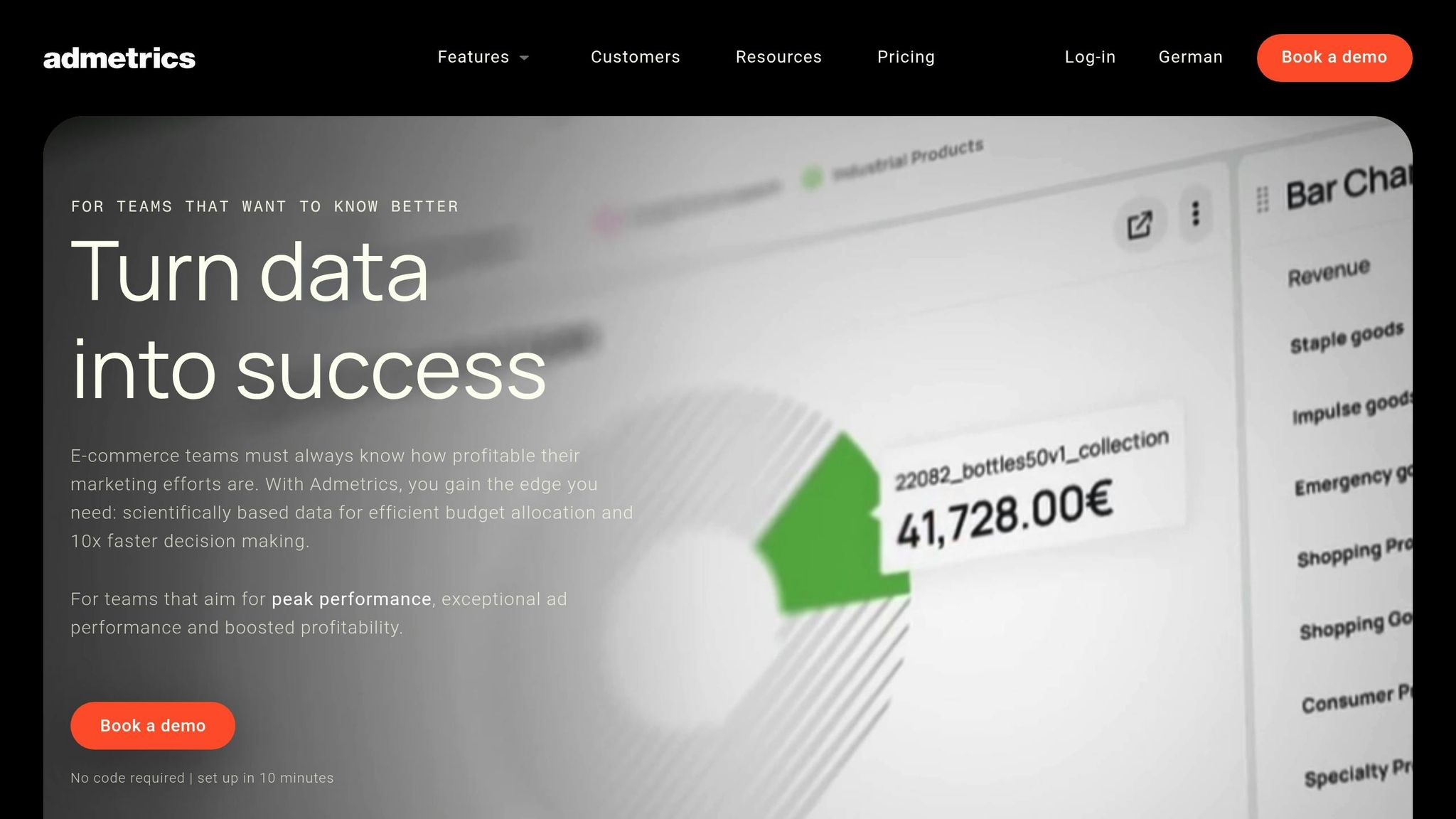
Admetrics Data Studio for Shopify helps direct-to-consumer (DTC) brands make smarter decisions about their paid ad strategies. With a perfect 5.0 rating from 14 reviews on the Shopify App Store, it’s clear that users appreciate the platform's ability to deliver actionable insights.
Integration with Marketplaces and Directories
Admetrics shines when it comes to bringing data together from multiple platforms. It connects seamlessly with major advertising channels like Instagram, Facebook, TikTok, and Google Ads. Beyond these, it also integrates with Twitter, LinkedIn, and Shopify, offering brands the ability to monitor performance across all key touchpoints. By consolidating over 100 metrics into a single dashboard, Admetrics provides a detailed view of customer journeys and marketing performance in one place. This unified approach ensures businesses have the insights they need to make informed choices.
Collaboration and Reporting Tools
Admetrics addresses major challenges in digital marketing, such as iOS 14+ tracking limitations and GDPR compliance, while offering robust analytics for campaign evaluation. These tools are indispensable for understanding how campaigns perform and where budgets are best spent.
Tom Raffield, a user based in the United Kingdom, shared his experience in July 2024, saying:
"Admetrics quickly became a valuable tool for understanding customer journeys and purchasing patterns, allowing them to refine campaigns and spend their budget effectively."
He also highlighted the platform's "exceptional onboarding and support".
The platform leverages AI to deliver predictive insights, helping brands identify high-performing product categories and build targeted audiences. This aligns with industry trends; a McKinsey study revealed that AI-generated content can reduce review times by 20% to 60%.
Admetrics offers flexible pricing options, including a free trial for new users.
Although it’s not a traditional tool for supplier sourcing, Admetrics’ deep analytics make it an excellent resource for fine-tuning digital marketing strategies. These insights can also help brands optimize their overall sourcing and supply chain decisions by basing them on real-world market performance.
9. MyAmazonGuy Sourcing Tools
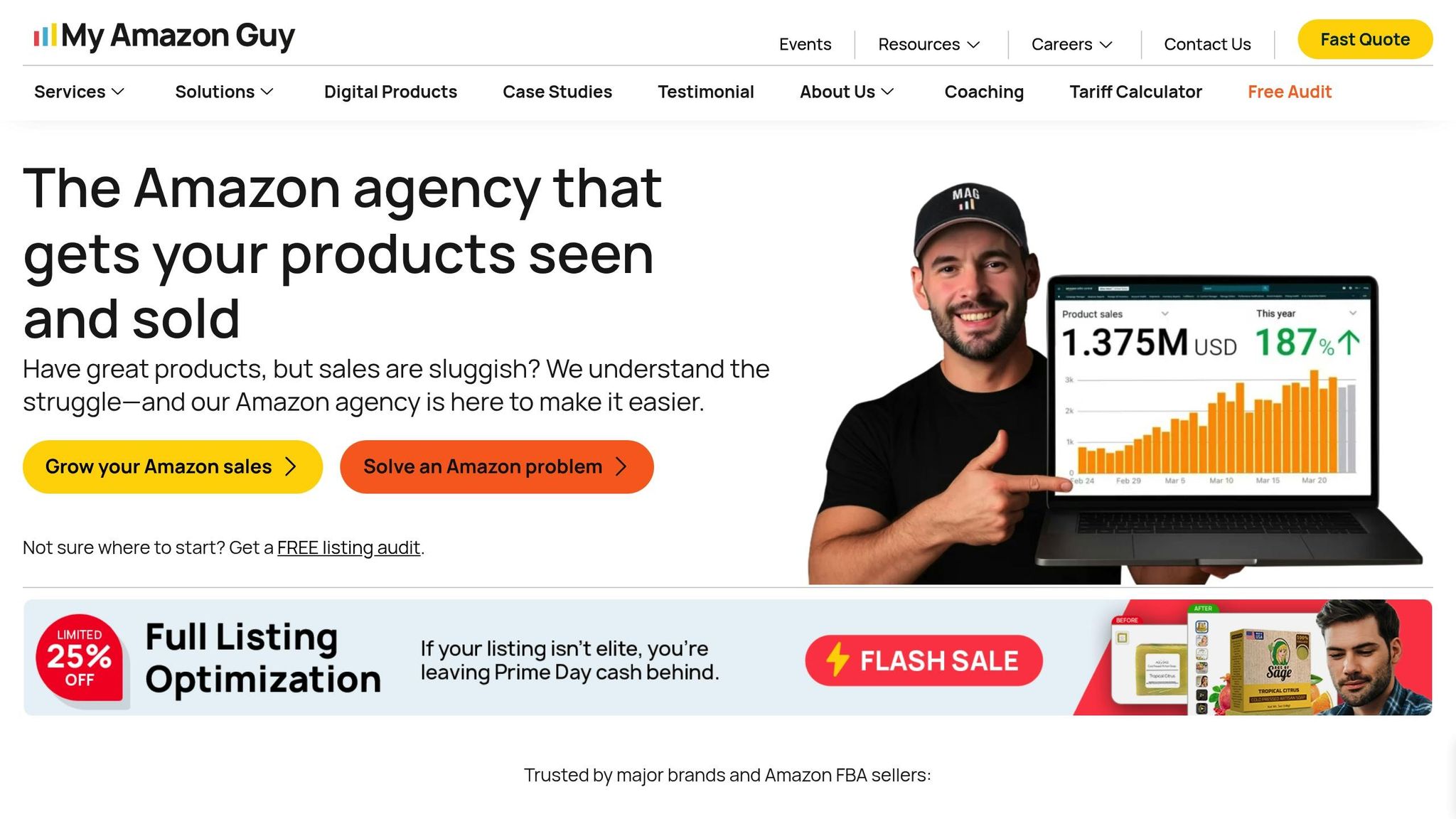
Navigating the competitive Amazon marketplace requires more than just good products - it demands smart sourcing strategies. With over 2,000 new sellers joining Amazon daily and millions already active, MyAmazonGuy provides tailored tools to help sellers stand out and succeed.
Supplier Discovery Capabilities
MyAmazonGuy focuses on equipping sellers with tools powered by actionable data. These tools are designed to identify profitable products and reliable suppliers, offering insights like sales estimates, competitor analysis, and supplier directories. This streamlined approach is critical in a marketplace where 89% of sellers turn a profit, and 63% do so within their first year .
The platform also emphasizes real-time market analysis and consumer demand insights. For instance, tools like Viral Launch offer over 20 features that assist sellers in discovering high-potential products and optimizing their sales processes. Similarly, solutions like Algopix provide detailed product research with real-time market data. Other tools, such as Tactical Arbitrage and Sourcemogul, simplify the process of retail arbitrage and product identification.
Compliance and Quality Assurance Features
Quality assurance is a cornerstone of MyAmazonGuy’s sourcing philosophy. They prioritize supplier verification through reputation checks, customer reviews, and performance history. Supplier audits are another key component, evaluating factors like manufacturing processes, quality control systems, and overall operations.
MyAmazonGuy strongly recommends product sample testing to assess quality and functionality before committing to large orders. They also advocate for clear supplier contracts that define quality standards and delivery expectations. To maintain ongoing reliability, they suggest tracking metrics such as on-time delivery rates and defect percentages, ensuring suppliers meet consistent benchmarks.
Collaboration and Reporting Tools
Performance tracking and market intelligence are central to MyAmazonGuy’s recommended tools. These tools provide real-time insights into market trends, competitor activity, and supplier performance. They also support a broad range of business needs, including product research, supplier management, and pricing analysis. MyAmazonGuy highlights the importance of data accuracy to ensure sellers have up-to-date market and sales information.
Reflecting the company's commitment to teamwork, founder Steven Pope emphasizes:
"Employees are critical to us. It is on Ownership and Management to support every layer above them."
This focus on support extends to MyAmazonGuy’s tool recommendations, which prioritize platforms with collaborative features. For example, SellerApp delivers real-time market insights and competitor analysis, enabling teams to make informed decisions together.
Rather than relying on a single tool, MyAmazonGuy promotes a multi-tool ecosystem tailored to direct-to-consumer (DTC) brands. This approach ensures sellers can effectively manage everything from supplier discovery to compliance and ongoing relationships, creating a comprehensive sourcing strategy.
10. Practical Ecommerce Directories
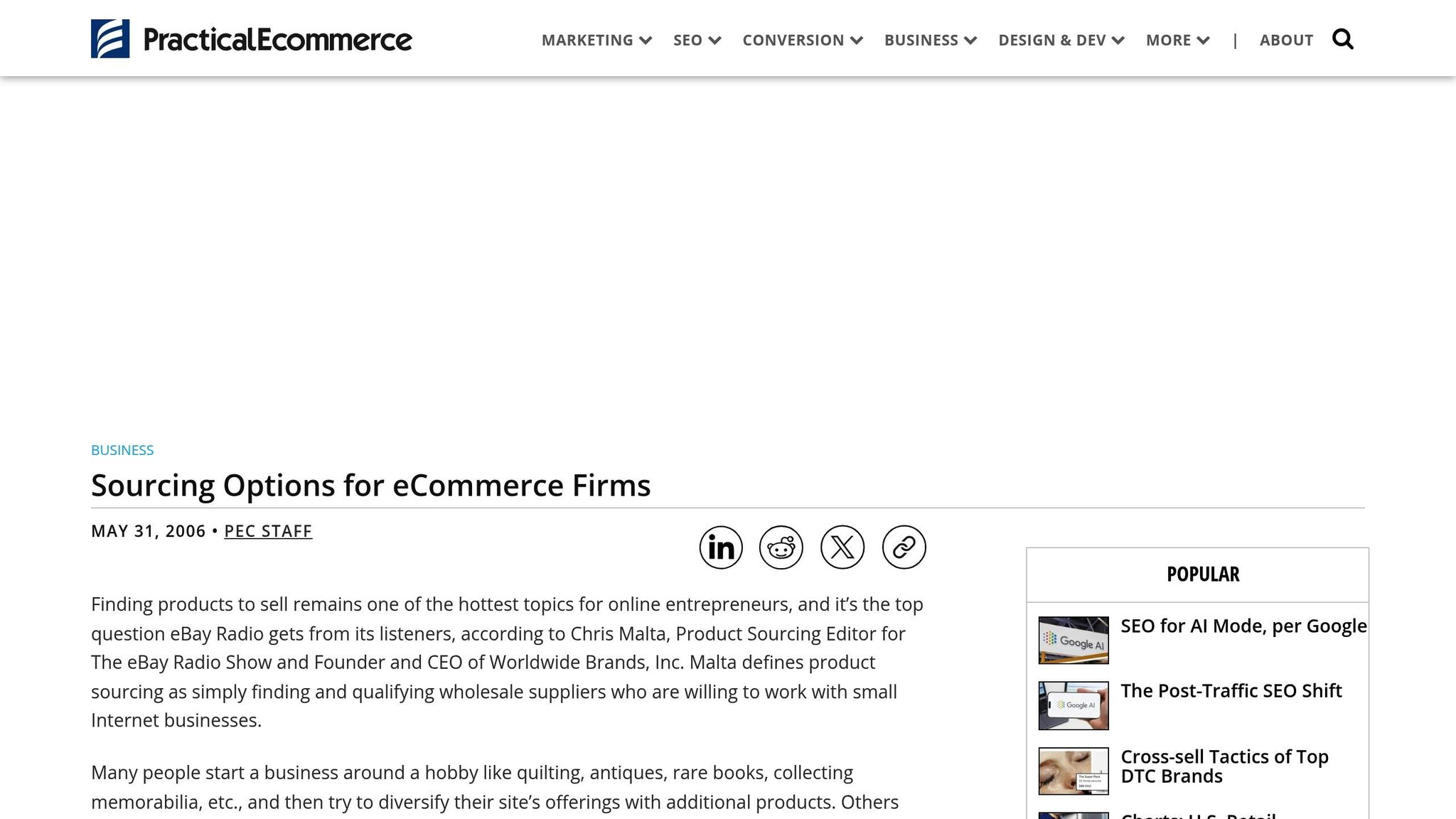
Practical Ecommerce Directories offer a streamlined way for DTC (direct-to-consumer) brands to find potential suppliers. These directories provide organized lists, making it easier for brands to connect with suppliers that align with their needs.
Supplier Discovery Capabilities
These directories categorize suppliers by industry, product type, or location, giving brands a clear starting point for research. While the directories provide a basic framework, brands must take the initiative to reach out and establish connections on their own. This hands-on approach can pave the way for building strong, personalized supplier relationships.
Compliance and Quality Assurance Features
Although these directories don’t include built-in compliance tools, they do provide essential supplier details like credentials, certifications, and contact information. Brands must independently verify this information and set rigorous quality standards. Regular audits and performance metrics - such as delivery times, defect rates, and customer satisfaction - are critical for ensuring suppliers meet expectations.
For brands focused on ethical sourcing, these directories serve as a starting point for deeper research. It’s important to investigate potential red flags, like questionable labor practices or environmental concerns, and request transparency from suppliers about their sourcing methods. This includes asking for details on materials, worker conditions, and environmental protections.
Integration with Marketplaces and Directories
Practical Ecommerce Directories don’t come with built-in integrations or advanced features like vendor analytics or direct transaction capabilities. Instead, they act as simple lists of potential suppliers, leaving brands responsible for managing relationships and integrations independently. While this requires more effort upfront, it allows brands to negotiate terms that align with their business models and develop tailored partnerships.
When working with suppliers found through these directories, it’s essential to leverage customer data to refine offerings and ensure clear communication about requirements and quality standards. This level of engagement helps brands create strong, mutually beneficial supplier relationships.
Tool Comparison Chart
Below, we've summarized the standout features of various sourcing platforms to help Direct-to-Consumer (DTC) brands make informed decisions. This comparison chart highlights essential features like supplier coverage, compliance tools, pricing, and support options.
| Tool | Supplier Coverage | Key Compliance Features | Pricing Structure | Support Options | Best For |
|---|---|---|---|---|---|
| ForthSource | AliExpress, Alibaba, Made-in-China | Smart supplier ratings, compliance awareness, vendor reliability scoring | Tiered subscription (Basic, Professional, Enterprise) | Team collaboration tools, exportable reports | eCommerce brands needing detailed supplier analysis |
| Alibaba | Global network, 200+ countries | Trade Assurance, verified suppliers, factory audits | Free basic membership, paid premium tiers | 24/7 customer service, dedicated account managers for premium | Large-scale sourcing with an established supplier base |
| Thomasnet | North American manufacturers | ISO certifications, quality standards verification | Subscription-based with custom pricing | Phone support, online resources | Domestic sourcing and compliance-heavy industries |
| Global Sources | Asia-Pacific focus, verified suppliers | Factory verification, quality inspections | Membership fees, exhibition costs | Trade show support, sourcing specialists | Product development and trade show sourcing |
| NicheSources | Specialized product categories | Basic supplier credentials | Pay-per-search model | Email support, online documentation | Niche product sourcing |
| Jungle Scout | Amazon supplier database | Basic compliance tracking | Monthly/annual subscriptions | Knowledge base, community forums | Amazon FBA sellers |
| Centric Software | Global PLM network | CAPA workflows, document control, audit trails | Enterprise licensing | Dedicated implementation team, training programs | Regulated industries (pharma, aerospace, food) |
| Admetrics | Performance-based supplier network | Automated compliance monitoring | Pricing based on performance | Analytics dashboard, reporting tools | Data-driven sourcing decisions |
| MyAmazonGuy Sourcing Tools | Amazon-focused suppliers | Amazon compliance requirements | Service-based pricing | Consulting support, strategy sessions | Amazon marketplace sellers |
| Practical Ecommerce Directories | Industry-categorized listings | Manual verification required | Directory access fees | Basic contact information | Budget-conscious startups |
Key Insights
E-sourcing systems have become essential for procurement teams, with 77% of large teams relying on these tools. Their use can lead to 12% savings in overall spend within a year. However, the pricing structures and features vary widely:
- Flexible pricing models: ForthSource’s tiered subscriptions cater to businesses at different growth stages, while tools like NicheSources use a pay-per-search approach, which can add up for high-volume users. On the other hand, enterprise solutions like Centric Software require a higher upfront investment but deliver advanced compliance features.
- Compliance tools: Compliance capabilities set many platforms apart. For instance, Centric Software offers CAPA workflows, document control, and audit trails, while directories like Practical Ecommerce require manual verification of supplier credentials. A notable example is an electric vehicle startup that used supplier scorecards to improve brand equity and consumer trust.
- Support options: Support varies significantly across platforms. Enterprise tools often include dedicated teams and training, while budget-friendly platforms rely on community forums or documentation. For complex sourcing needs, robust support can make a critical difference.
When choosing a platform, procurement experts recommend focusing on tools that provide spend visibility, vendor management, contract handling, and analytics. These features are particularly valuable as DTC brands scale their operations and face more intricate sourcing challenges.
This chart offers a quick reference, but the right choice will depend on your business’s unique needs and goals.
Final Thoughts
Choosing the right supplier sourcing tool is a critical step toward building a solid foundation for growth and staying compliant. As Pete Gilligan, VP of Growth, aptly puts it:
"The right supplier can be your golden ticket to e-commerce success, while the wrong one can tank your business before you even launch".
This insight underscores the importance of aligning your sourcing strategy with clear, measurable business objectives.
Each sourcing tool is designed to address specific needs at various stages of a business. Whether you're handling your first set of orders or managing the complexities of an expanding supply chain, it's crucial to match the tool's features to your current business stage. With DTC ecommerce sales expected to hit $186.6 billion by 2025, up from $134.5 billion in 2023, focusing on strategic supplier relationships is more important than ever.
To build a strong foundation, prioritize long-term partnerships over transactional relationships. This involves implementing risk management strategies, diversifying your supplier network, and maintaining open communication channels. As Hafez Ramlan highlights:
"Maintaining a steady inventory flow is critical for any e-commerce business looking to meet customer demands and scale effectively".
Evaluate your specific needs in areas like product research, supplier management, and pricing analysis. Take advantage of free trials when available, assess the accuracy of data provided, and ensure the platform offers dependable customer support. Considering that retailers typically spend 60-70% of the final consumer price when buying wholesale, selecting the right tool can significantly impact your bottom line.
Looking ahead, the supplier sourcing landscape is evolving rapidly. AI and predictive analytics are becoming standard features, offering tools with spend visibility, vendor management, and analytics to help businesses navigate more complex sourcing demands.
Ultimately, choose a platform that grows with your business, supports compliance, and helps you establish a dependable supply chain. With the right tool, you'll be better equipped to scale your operations and meet the challenges of an expanding e-commerce market.
FAQs
What features should DTC brands prioritize when choosing a supplier sourcing tool?
When choosing a supplier sourcing tool, DTC brands should focus on features that simplify workflows, maintain compliance, and allow for growth. The right tool should help you find and evaluate suppliers, manage relationships, and keep costs under control.
Here are some key features to prioritize:
- Supplier discovery: Access to a comprehensive database to quickly locate reliable suppliers.
- Cost and compliance management: Tools to evaluate costs while ensuring suppliers meet all necessary regulations.
- Integration capabilities: Compatibility with systems you already use, like inventory or ERP software, for smoother operations.
An intuitive, easy-to-use interface is also crucial. A tool that's simple to navigate ensures your team can adopt it without a steep learning curve. Focusing on these features will help you create a supply chain that’s efficient and tailored to your business goals.
How does predictive analytics improve supplier sourcing and procurement for DTC brands?
Predictive analytics offers DTC brands a smarter way to manage supplier sourcing and procurement. By diving into historical data and market trends, it helps forecast demand, fine-tune inventory levels, and simplify purchasing decisions. This forward-thinking strategy not only cuts costs tied to overstocking but also ensures products are in stock when customers need them. Plus, it gives businesses the upper hand in negotiating better terms with suppliers.
It also plays a key role in evaluating supplier performance. By analyzing past performance, brands can pinpoint dependable partners and address potential supply chain hiccups before they escalate. With these insights, businesses can create contingency plans, strengthen supplier relationships, and build a supply chain that's both efficient and resilient.
Why is managing compliance important when choosing a supplier sourcing tool?
Why Compliance Matters in Supplier Sourcing Tools
Keeping compliance at the forefront when choosing a supplier sourcing tool isn't just a box to check - it's a critical step in protecting your business. Ensuring that your suppliers adhere to legal, regulatory, and internal standards helps you avoid serious risks, like legal fines, damage to your reputation, or disruptions in your supply chain. These issues can ripple through your operations, leading to costly setbacks.
But it’s not just about risk management. A strong commitment to compliance signals to your customers and partners that you stand for quality, safety, and ethical business practices. This goes a long way in building trust and credibility. Plus, by making compliance a priority, you’re setting the foundation for a supply chain that’s not only dependable but also capable of scaling as your DTC brand grows.
